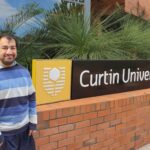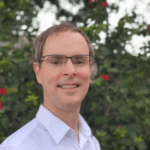Chancellor, Vice-Chancellor, staff of the University, graduands and distinguished guests.
I commence by acknowledging the traditional Nyungar custodians of the land on which this distinguished University rests.
It is with great pleasure that I accept an Honorary Doctor of Technology Degree from the University which provided me not only 37 years of wonderful, exciting employment; but also with a multitude of challenges and a great deal of joy and satisfaction. My work at Curtin (and WAIT as it originally was) encompassed two main phases. The first was a 19 year period within the School of Physiotherapy in the Division of Health Sciences (15 of those as Head of School) while the second phase occupied 18 years, of which a little more of half was as Vice-Chancellor and President.
I thoroughly enjoyed all of my times at Curtin and can think of no better place where I could have so profitably spent most of my adult life. I am deeply grateful for the opportunities provided to me and immensely proud of the University’s staff and students of our continuing achievements and successes. We had of course, at least our share problems, frustrations and setbacks, but tonight is not the occasion to air those.
This is a great University and has become so because it has built success upon the quality and endeavour of it’s’ staff and students who are truly the life-blood of this institution. We are doubly fortunate in bearing the name of Curtin, the person many see as Australia’s greatest Prime Minister.
As the most recent graduates of this excellent University, you have also had the good fortune to have spent your important formative years here.
Your education equips you to deal with the challenges, opportunities and change, which will inevitably be your future.
My address tonight is made directly to you and begins by congratulating you on your formidable achievements and wishing you well in the years ahead.
The talk will incorporate, albeit briefly, observations concerning your own likely futures as clinicians and professionals in health care, along with my own particular view as to what is presently the area of greatest need in this wealthy state of ours. I refer of course to the health needs nutrition, education and living conditions of our first citizens, our Indigenous Australians. You will also be offered some advice. Vice-Chancellors and especially those recently retired can’t help themselves when it comes to offering gratuitous advice to a captive audience.
But first a story:
It concerns a previous Australian Ambassador in the USA. Our Ambassador had been in Washington for just a few months and had spent considerable time and effort in contacting and talking with senior members of the American press and was very gratified to take a call just prior to Christmas from Jack Anderson, the most influential talk-back host in American radio. The Ambassador was touched to think that this eminent broadcaster would think so highly of him that he would call and especially that he would then ask what sort of a gift the Ambassador might like to receive at Christmas. Although very happy to be asked, and since he was keen to make a good impression, our Ambassador felt he ought to be modest and not ask for too much. He looked around his office and noticed a box of Australian dried fruit on his coffee table, a gift from his wife, and said “I’d quite like a small box of dried fruit”. The radio personality thanked him and rang off.
Come Christmas Eve, the Ambassador was listening to Washington radio where Anderson led off by saying that he had spoken to a number America’s allies and asked them what it was they most wanted for Christmas. The responses were as follows:
The German Ambassador said he hoped for continuous economic growth and prosperity, together with political stability in Eastern Europe.
The French Ambassador anticipated an end to famine, a cure for Aids and prosperity for Africa.
The English Ambassador wanted to see resolution in the Middle East, stability in Iraq and a reduction in greenhouse emissions.
While the Australian Ambassador, “…would quite like a small box of dried fruit”.
There is an important moral to this story for health practitioners. Make certain that what you hear from a patient/client is what they are truly trying to communicate.
As Western Australia’s newest health practitioners, many of you may well have read an article by Mike Daube, Professor of Health Policy at Curtin and a former Director General of Health in WA, which appeared in “The West Australian” about a week ago. Professor Daube made a number of important and salient observations. He made it clear that (and I quote): “Australia has one of the world’s best health systems. WA is among the best in the country and West Australians have some of the world’s longest lifespans.” Indeed, our health care professionals are superb, we fight well above our population weight when it comes to the quality and quantity of health and medical research and Australian graduates in all health disciplines are eagerly sought as employees in most foreign countries. This latter aspect may well already have come to your attention as international employment agencies regularly recruit medical, nursing, dental, child health, community and public health, environmental health, aged care etc, professionals from Australia; often straight after graduation. There is no shortage of work worldwide and as a scarce commodity; you will continue to attract a premium payment for your services. In this regard, your choice of a profession is most astute.
Nevertheless, in spite of the above, wherever you go across Australia and globally you will find that many believe that their health care system is in crisis. As Mike Daube showed, health is “…awash with pressure groups, from small non-government organisations to sophisticated and powerful organisations such as the Australian Medical Association, most of them expert in manipulating politicians and media.” Indeed the influence of the media in regard to stories of disaster, negligence, waiting lists, incompetence, mismanagement and financial incompetence, lead many to believe that our health system, wherever we live in the world, is battling to survive and on the brink of disaster. This flies in the face of the knowledge we in WA have of the great competence of our health professionals and administrators and of the regard in which Australia’s health care systems are held worldwide.
You, as new graduates, as dedicated professionals, are now an important part of this system. It is overall a good system and you have a level of education and skill at least the equal of the best to be found worldwide. Don’t confuse community dialogue about what will always be an imperfect system, one in which “…everyone wants the best possible service – and right now!” as being adverse criticism of your own skills and knowledge, they are different issues altogether.
Having said this, there does remain a situation in regard to the health care of Indigenous Australians, which demands immediate and concentrated action. Professor Marcia Langton recently wrote: “The crisis in Aboriginal society is a public spectacle, played out in a vast reality show through the media, parliaments, public service and the Aboriginal world.
This obscene and pornographic spectacle shifts attention away from every day lived crises that many Aboriginal people endure: or do not, dying as they do (early and) at excessive rates (The Weekend Australian, 26-27 January 2008).To date, our efforts to deal with this complex situation have been inconsistent, spasmodic, piece-meal and usually badly flawed. The health of our Indigenous population, as shown by the major mortality and morbidity measures is at least as bad as it was 50 years ago, while that of the larger population as a whole is significantly better. This is a shameful inditement of Australian society, albeit one we have begun to recognise and bring out into the open.
We as Australians have no option but to throw our energies, resources and whatever else it takes, to correcting this catastrophe. It won’t be a quick fix.
As health professionals, you will be in this front-line in the times ahead. Some of you will direct, manage and administer the systems we need to put in place, others will measure outcomes and results indicating future directions, while many of you will be in the trenches, dealing on a day-to-day basis with the health care needs of individual Indigenous Australians. Remember, at all times that you work with and not on your clients and patients; that you need to safeguard their dignity and self regard as you would your own and that, especially to begin with, they will be suspicious, insecure, apprehensive and perhaps even aggressive toward you. They have been promised much in the past and have mostly found the outcomes to be ephemeral and illusionary. It is a truly great challenge.
Nevertheless, you are clearly up to it.
Congratulations again on your achievements, enjoy your working life, celebrate your successes and always remember and maintain personal contact with your University, Curtin.


